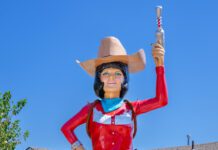You don’t get much closer to breaking big nationally than the Tulsa band Cargoe did in the early ‘70s.
And when you get that close and the brass ring suddenly leaps away from your fingertips – for reasons that have little to do with your talent or commitment – the letdown can last for a very long time.
“I wasn’t bitter; I was just frustrated,” says vocalist-bassist Max Wisley, a founding member of Cargoe.
“I’d wanted it so badly, and when I didn’t get it and couldn’t have it, I didn’t want to tempt myself any more. So when I moved back to Tulsa and started looking for work, I intentionally bought a car without a radio in it. I didn’t want to listen to music. I didn’t buy records. That lasted probably from ’73 to ’75 or ’76, and then I started getting back into music, listening to Foreigner and some of those guys who were out at the time.”
If not for a bad break or two, Cargoe’s members would have been some of those guys. In 1972, when the group’s first disc came out from the upstart Memphis label Ardent Records, stardom seemed to be within reach. The band – Wisley, keyboardist-guitarist Bill Phillips, lead guitarist Tommy Richard and drummer Tim Benton, all of whom sang – had relocated to Tennessee at the urging of KAKC disc jockey Jim Peters, who had Memphis record-biz connections.
By then, Cargoe’s members had been honing their sound for several years in their hometown after breaking in as house band at a teen-scene club called the Machine, owned by Tulsa dance instructor Skilly Forsman.
The group, originally known as What For, had been renamed Rubbery Cargoe by a Forsman associate; like so many rock monikers of the time, the name was trippy and weird, and the group did its best to live up to that categorization, dishing up psychedelic sounds to the Machine’s young patrons. Soon, Rubbery Cargoe was hot enough to open for the Animals at a 1968 Tulsa Civic Center concert.
A couple of years later, the band – and Peters, who was managing – moved to Memphis. Also around that time, the group became, simply, Cargoe.
The band members plugged away for the next couple of years, ending up with producer Terry Manning and Ardent, a label best remembered today for recording the group Big Star, which offered up a fresh synthesis of ‘60s sounds that would come to be known as power pop. But while Big Star is generally acknowledged as the seminal power-pop outfit, Cargoe was working pretty much the same turf, almost breaking through with a single called “Feel Alright.”
It soared onto the radio charts in the Tulsa and Memphis markets – among several others – back before corporate radio made the term “regional hit” obsolete.
But the band never was able to break out nationally. A lengthy, unbylined Cargoe story on the Rock and Reprise website (www.rockandreprise.net) blames the distribution deal Ardent had with the Memphis-based R&B label Stax, which simply couldn’t, or didn’t, get Ardent records into enough outlets across the country. And when record stores couldn’t get product, they, and their customers, looked elsewhere.
So, in 1973, when Ardent went under, the members of Cargoe dejectedly moved back home and started looking for straight jobs, leaving music – and each other – behind.
“We never got back together (as a band),” Wisley says. “We were friends, but at least for those first five years or so, we didn’t really stay in touch with one another.”
Still, both Wisley and Phillips had several songs that they’d planned for the group’s second studio album, and Wisley continued holding onto cassettes of those original tunes.
“Even though we became professionals in other areas,” explains Wisley, a network engineer for Hewlett-Packard, “we each still had music in our blood.”
After working in Los Angeles and elsewhere, Wisley moved back to Tulsa in 2000. One day, he ran into Bill Phillips’ brother, got his old bandmate’s number and called him up. Phillips, at the time, was playing some jobs with the Tulsa vocalist-guitarist Randy Ess, and soon the three were working together in an act called Replay, with a repertoire that leaned heavily toward Beatles music. Through Ess and Phillips, Wisley became acquainted with Peter Mayo, the keyboardist and leader of the Brady Street Orchestra, and before he knew it, Wisley was back in front of a microphone on a regular basis.
Then, other things began to happen. In 2003, JVC Japan re-issued the Cargoe disc as a part of its “Roots of Power Pop” series. A year later, Cargoe’s former producer Terry Manning – whose resume includes discs from ZZ Top, Led Zeppelin, George Thorogood and Lenny Kravitz – discovered some live Cargoe tracks and released them on his own label.
Meanwhile, Wisley and Phillips laid down some demos with another noted Tulsa musician, the veteran guitarist Frank Brown, and then met up with guitarist-engineer Steve Thornbrugh. By this time, the idea of a new Cargoe record, featuring those tunes that Wisley had been carrying around for decades, was gaining momentum.
Thornbrugh and his studio supplied the final piece.
“Steve had been working on some things Bill was involved in, and when Bill introduced me to him, Steve said, ‘I’ve listened to the original Cargoe record, and I’d love the opportunity to record you guys,’” remembers Wisely.
They started working together, and, Wisley adds, “Slowly, I discovered that Steve was quite a guitarist himself. He’s our age, so he had that ‘70s appreciation and feel in his bones, too.”
With original member Tommy Richard not involved in the new project, Thornbrugh became the band’s lead guitarist. Then Cargoe drummer Tim Benton, a Norman resident, got on board, and three of the four founders of the group were recording together again, nearly 40 years after performing what they figured would be their last gig as a band.
The new disc, with guest appearances from several other Tulsa players, is a gem of a recording, full of lush, sparkling harmonies and power-pop tunes reminiscent of such classic acts as the Kinks, Yes, and mostly mid- to late-era Beatles. Titled simply Cargoe, the album evokes an earlier era without sounding stale or hackneyed, and that’s just what the group was gunning for.
“When we weren’t able to make a follow-up record (with Ardent), we felt we’d missed our opportunity,” explains Wisley. “So what we wanted to do was make a record that would be our next step, but still have the characteristics of the early ‘70s the way we knew them.”
The CD is already finding a worldwide audience and positive reviews, with some of the band’s original fans relaying their delight via the band’s website. Now, says Wisley, the members are even talking about live shows again
And, he adds, “We’re starting work on the next Cargoe record. Bill’s so charged that he told me, ‘I’m writing down lyrics all the time. My head’s just bubbling with song ideas.’ Steve’s written at least four songs, and I just listened to one of his demos that was fantastic.”
Cargoe may just be the latest in a long line of rebirths that continue to challenge F. Scott Fitzgerald’s famous observation about how there are no second acts in American life. But rarely, if ever, has the intermission between acts one and two lasted as long as it did for this particular band of Tulsa rockers – who, after a four-decade lull, are now rolling again.

























